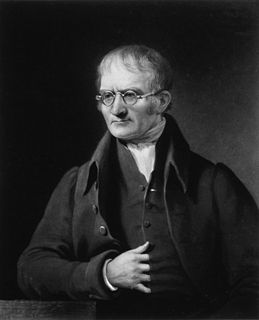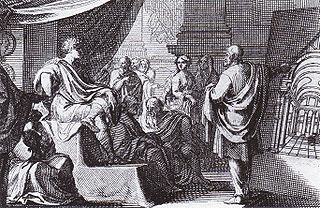A Quote by John Dalton
We should scarcely be excused in concluding this essay without calling the reader's attention to the beneficent and wise laws established by the author of nature to provide for the various exigencies of the sublunary creation, and to make the several parts dependent upon each other, so as to form one well-regulated system or whole.
Related Quotes
Modern physics has taught us that the nature of any system cannot be discovered by dividing it into its component parts and studying each part by itself... We must keep our attention fixed on the whole and on the interconnection between the parts. The same is true of our intellectual life. It is impossible to make a clear cut between science, religion, and art. The whole is never equal simply to the sum of its various parts.
BEAUTY will result from the form and correspondence of the whole, with respect to the several parts, of the parts with regard to each other, and of these again to the whole; that the structure may appear an entire and compleat body, wherein each member agrees with the other, and all necessary to compose what you intend to form.
There is a strong current in contemporary culture advocating ' holistic ' views as some sort of cure-all... Reductionism implies attention to a lower level while holistic implies attention to higher level. These are intertwined in any satisfactory description: and each entails some loss relative to our cognitive preferences, as well as some gain... there is no whole system without an interconnection of its parts and there is no whole system without an environment.
Men are impatient, and for precipitating things; but the Author of Nature appears deliberate throughout His operations, accomplishing His natural ends by slow, successive steps. And there is a plan of things beforehand laid out, which, from the nature of it, requires various systems of means, as well as length of time, in order to the carrying on its several parts into execution.
The key to good worldbuilding is leaving out most of what you create. You, as the author, had damn well better know the where all that dragon food comes from, but that doesn't mean that I, as a reader, want to read a five thousand word essay about you explaining it to me. I don't need to see the math, but I can tell by the details you provide whether or not you've thought these things through to their logical conclusions.
For the religious, passivism [i.e., objects are obedient to the laws of nature] provides a clear role of God as the author of the laws of nature. If the laws of nature are God's commands for an essentially passive world ..., God also has the power to suspend the laws of nature, and so perform miracles.
It is interesting to contemplate an entangled bank clothed with many plants of many kinds with birds singing on the bushes, with various insects flitting about and with worms crawling through the damp earth and to reflect that these elaborately constructed forms so different from each other and dependent on each other and so complex a manner have all been produced by laws acting around us.
A very wise father once remarked, that in the government of his children, he forbid as few things as possible; a wise legislature would do the same. It is folly to make laws on subjects beyond human prerogative, knowing that in the very nature of things they must be set aside. To make laws that man cannot and will not obey, serves to bring all law into contempt. It is very important in a republic, that the people should respect the laws, for if we throw them to the winds, what becomes of civil government?
To the second end, we hold that minimum wage commissions should be established in the Nation and in each State to inquire into wages paid in various industries and to determine the standard which the public ought to sanction as a minimum; and we believe that, as a present installment of what we hope for in the future, there should be at once established in the Nation and its several States minimum standards for the wages of women, taking the present Massachusetts law as a basis from which to start and on which to improve.
The parts of a machine work with a maximum of cooperativeness for a common result, but they do not form a community. If, however, they were all cognizant of the common end and all interested in it so that they regulated their specific activity in view of it, then they would form a community. But this would involve communication. Each would have to know what the other was about and would have to have some way of keeping the other informed as to his own purpose and progress.
But since the brain, as well as the cerebellum, is composed of many parts, variously figured, it is possible, that nature, which never works in vain, has destined those parts to various uses, so that the various faculties of the mind seem to require different portions of the cerebrum and cerebellum for their production.




































